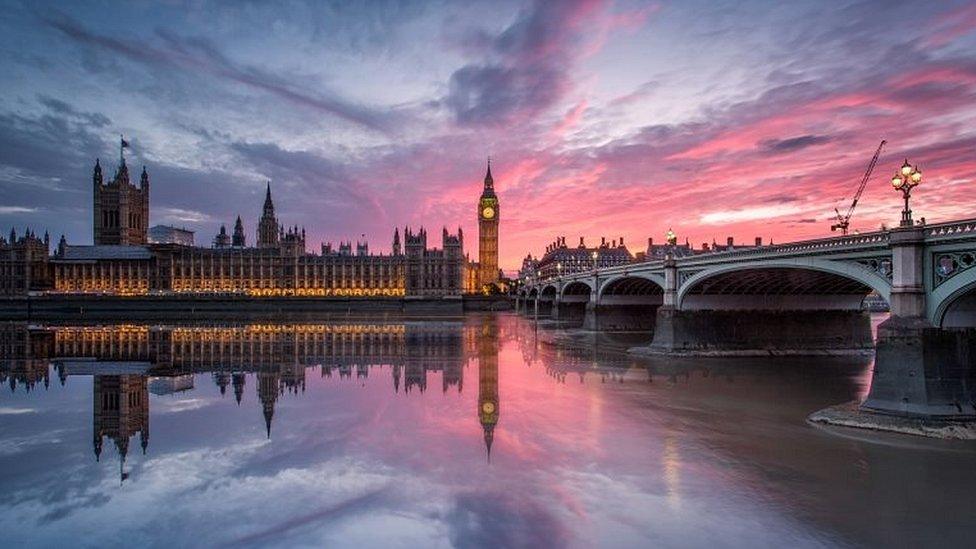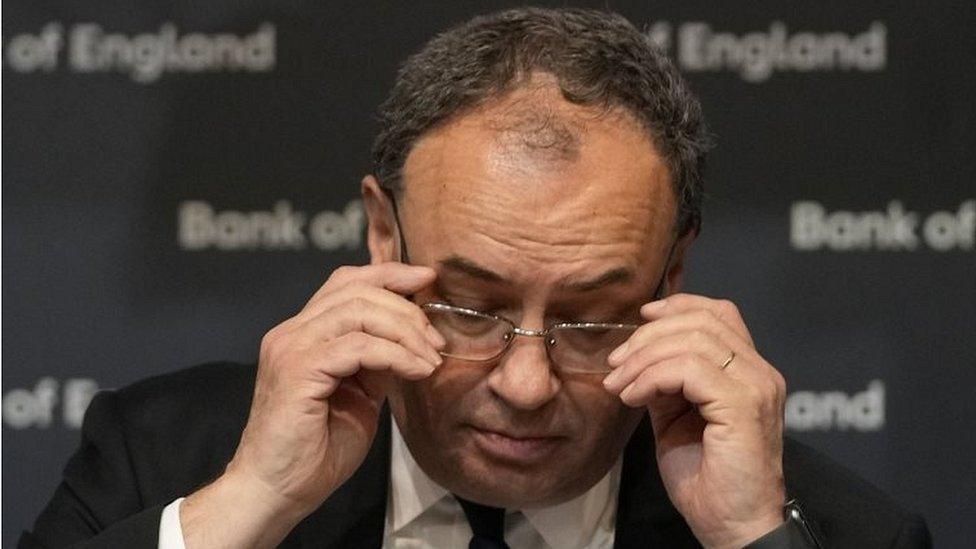What's happening in Parliament this week?
- Published

The twin themes of domestic and international crisis run through events in Parliament next week.
Perhaps because most of the key people who would have wanted to speak were not in Westminster on Thursday, MPs didn't get a chance to discuss the UK's new defence pact with Finland and Sweden last week.
So expect a statement from Boris Johnson on Monday, and a longer chance to mull over the war in Ukraine in a debate on NATO and international security - again led by the PM - on Thursday.
The Foreign Affairs Committee will also have a chance to quiz Foreign Secretary Liz Truss on Wednesday, in a session which will look at the impact of the Ukraine conflict on the aid budget.
Then there's the continuing the government's release of the security advice the prime minister received before giving a peerage to Lord Lebedev Labour complained that the documents eventually published in response to a Commons motion were "so heavily redacted, it is utterly pointless".
Expect more points of order and possibly other consequences (raising the issue as a contempt of Parliament, perhaps?), including a ruling from the Speaker on whether the matter should be debated in the Commons.
And of course there's the ongoing saga of Covid lockdown breaches - confirmed and alleged.
Next week's formal agenda is dominated by the continuing debate on the Queen's Speech, the government's new programme of legislation.
These will focus on the themes: "Making Britain the best place in the world to grow up and grow old" (Monday); "Tackling short-term and long-term cost of living increases" (Tuesday); and "Achieving economic growth" (Wednesday).
The Opposition parties will put down amendments to what is, formally, a debate on an address thanking Her Majesty for the Queen's Speech (known in parliamentary jargon as the "gracious speech").
Labour get two amendments and the SNP one - while smaller parties like the Lib Dems can put down amendments, but won't get them debated. The Lib Dems are planning something on the problems of rural areas, which is of course entirely unconnected to the forthcoming Tiverton and Honiton by-election.
Peers gear up for new battle lines over legislation
A parallel series of debates will take place in the Lords, with peers discussing the economy, energy and the environment on Monday; education, welfare, health and public services on Tuesday; and foreign affairs, defence and trade on Wednesday.
Listen out for the sound of markers thudding down as they signal where they might seek to rewrite the government's legislation.
One lesson of the last session of Parliament was that ministers have lost control of a key stage of law-making, with cross-party alliances of peers defeating the government again and again on amendments during the Lords' detailed report stage considerations.
Most of these defeats were eventually reversed in the Commons - and the government will seek revenge for its most spectacular loss, when peers voted down an attempt to add new public order powers to the Police, Crime, Sentencing and Courts Bill, by trying to push through the same powers in a free-standing Public Order Bill, external.
Peers have yet to see the details of many of the promised bills, but there will certainly be plenty of issues where more of these cross-party alliances may be mustered, particularly on human rights and giving ministers sweeping powers to rewrite laws inherited from the EU.
Demanding timetable
Even if Their Lordships don't start firing back dozens of unwelcome amendments, delivering the government's programme inside a normal 12-month or so parliamentary session looks extremely demanding, with a whopping 38 bills to be processed.
That compares with 30 in the two-year session which began in 2017, and 42 in the two-year session which opened the Coalition years.
It may mean MPs face an extra-long parliamentary session, but some observers speculate that the government might be prepared to ditch much of its programme and call a snap election. Remember they've legislated to return that option to the prime minister.
In any event the Queen's Speech is about laws, and most possible solutions - or at least palliatives - for the cost of living crisis revolve around taxes and government spending. It's suggested the Chancellor will have something to offer in the summer.
With Rishi Sunak due to face Commons questions on Tuesday, expect plenty of probing from all sides, with a chance to follow up his answers in the ensuing segment of the Queen's Speech debate, on the cost of living crisis.
Private Members' Bills
There are other plotlines as well. The annual Private Members' Bill ballot takes place on Thursday - giving a random collection of backbenchers some level of debating priority on legislation of their choice, in Friday sittings of the Commons.
Much depends on who wins. Some MPs are happy to put their name to "handout bills" from the government, enacting some useful change that didn't make the cut in the official programme of legislation.
Others may go for a declaratory bill that dramatises a cause, but which the government will organise to block. A good example might be a new incarnation of the Climate Emergency Bill, backed by major green pressure groups. Watch this space.
Wednesday will also see an election to replace the departed Neil Parish as Chair of the Environment, Food and Rural Affairs Committee. All MPs have a vote, but the candidates must be Conservatives, because the carve-up agreed with the Opposition allocates this committee chair to the Tories. The Speaker will announce the result in the chamber later that day.
Nominations close on Tuesday, and the rumour mill has quite a number of potential candidates: in no particular order, Sir Geoffrey Clifton Brown, Sir Robert Goodwill, Neil Hudson, Robbie Moore, Fay Jones and Anthony Mangnall - all strenuously seeking to avoid the kiss of death label of being the government's preferred candidate, which guarantees that they would get no votes from Opposition MPs.

Governor of the Bank of England Andrew Bailey will answer questions from MPs on the Treasury Committee
Meanwhile, Ian Mearns, Chair of the Backbench Business Committee (a post which must go to an Opposition MP) is up for mid-term re-election. Usually there's no challenger, but watch that space.
Monday will see the Treasury Committee questioning Governor of the Bank of England, Andrew Bailey, as inflation soars towards 10 per cent. The next day, 'The Only Way Is Essex' star Charlie King will talk about cosmetic procedures and the pressures of working in the fitness industry, in the final session of Health and Social Care's inquiry into the impact of body image on mental and physical health. He'll be followed by Minister for Mental Health Gillian Keegan.
On Thursday, Digital, Culture, Media and Sport Secretary, Nadine Dorries appears before the DCMS Committee to discuss the Online Safety Bill, the futures of the BBC and Channel 4, and the impact of Covid and Brexit on the cultural sector.
